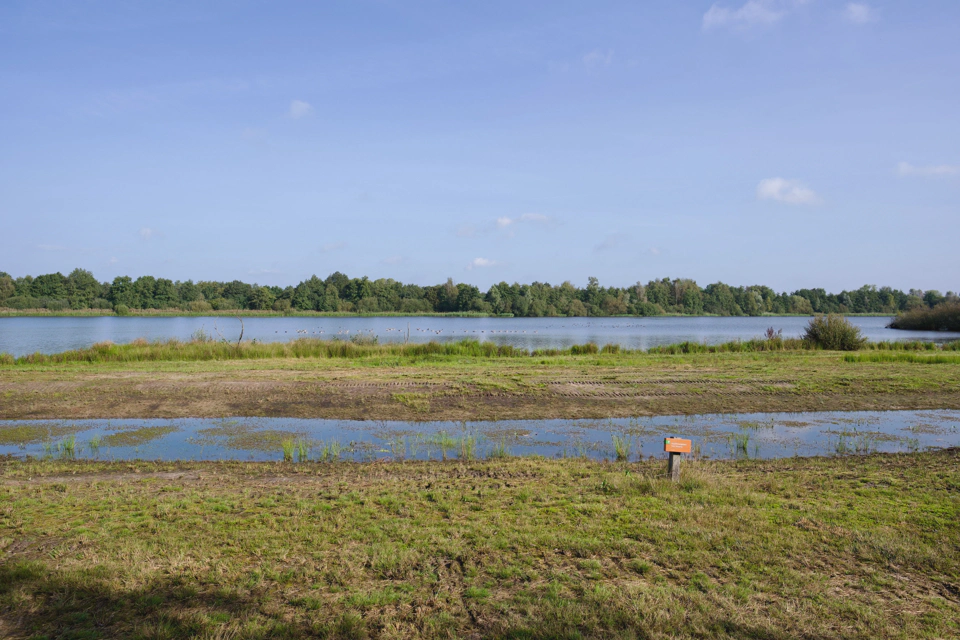Today we biked to a nearby bird lookout part of Leenderbos (possibly “forest of linden trees”), a forest in the south of the Netherlands. It was already mid-morning by the time we arrived, and although there were dozens of birds swimming in the lake in front of the lookout, they were mostly ducks and geese.
At the lookout we met a man who was taking pictures with a massive camouflage tele-lens. I only had my fixed lens and it felt like I had brought a Seat Ibiza to a race track.
We sat next to the man and watched the birds skate smoothly over the lake. Today was sunny, a rare occurrence in this country, and warm. We could only hear ducks chit-chatting and, occasionally, gravel shift under our feet. For a few moments my mind and time stopped. Ducks, geese, water, and trees were all that was.
My partner told me that the last time she was here, more than twenty years ago, the lookout was half the size, but otherwise, the place was as she remembered. I found it curious how some things change so little, while others, like the shops lining the street where I grew up in Madrid, seem to change every year.
We soon realized we weren’t going to see other bird species at that time, and we went back to our bikes. We rode past houses with carefully trimmed gardens, corn fields, farms, and trails lined by trees. I didn’t see many people in the streets; a woman gardening here, a man building a rooftop there. I saw cars but, perhaps because of the harsh midday light, I couldn’t see the drivers and it felt like we were crossing paths with big impersonal machines. It was like being in a post-apocalyptic movie.
Our next stop was the headquarters of a bee club in the middle of a forest. The complex had a building, a lush and wild garden, and a couple of sheds. There wasn’t anyone here either, only hard-working bees unaware that it was Saturday. The garden had informational plates where I learned interesting facts like “bees visit about 2 million flowers to produce 1kg of honey”, “bees fly about 800km in their lifetimes”, “fertilized eggs become female bees, unfertilized eggs become males”, or “bee queens lay about 200,000 eggs per year and up to 2,000 per day during peak season.”
The garden didn’t look manicured by the same OCD owners of the gardens we saw earlier. Here branches danced freely outside the invisible and arbitrary boundaries that constricted the other gardens. Mushrooms mushroomed all over the place, frogs jumped in front of us, and, basically, the garden didn’t look like it had been forced to pose for a photo. Based on what I’ve learned recently, all this freedom was probably good. At the museum inside the national park Het Nationale Park De Hoge Veluwe, a display described how the park personnel originally removed fallen trees as soon as they fell, but changed their practice when one day, after a big storm they saw how much life sprouted around fallen trees if you just left them be.
A book I’m currently reading refers to this differently:
If the land mechanism as a whole is good, then every part is good, whether we understand it or not. If the biota, in the course of aeons, has built something we like but do not understand, then who but a fool would discard seemingly useless parts? To keep every cog and wheel is the first precaution of intelligent tinkering. ~ Aldo Leopold, forester, (via Thinking in Systems)
After saying “bye” to the bees, we got on our bikes and rode home for lunch. During this last ride, I felt immense gratitude towards my two redundant navigational systems: my partner and my phone. The scenery here is enchanting, but it also looks like a maze to me. Without humans around to ask for directions, I’m pretty sure I would die on the curbside. My hunter-gatherer ancestors would be ashamed of my lack of orienteering skills.
Connections
- Complex systems: think twice before messing with complex systems that you don’t fully understand.
- Self-organizing systems: bee club, law of attraction.
- Work ethic: doing things makes me happy. What’s behind that behavior? Is it really just dopamine? Is it a reaction to unpleasant sensations? Is it laziness to not do harder things?
- Yoga: this isn’t the first time that I experiment extraordinary mental stillness while in nature. Why does it happen? What makes the mind to switch off?
